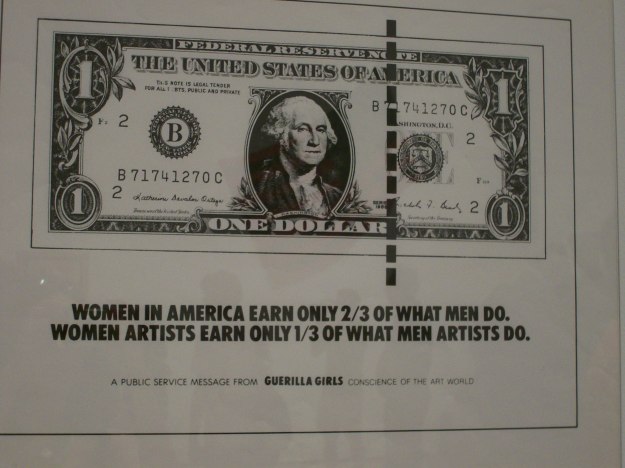Re: He said/he said – I definitely found it interesting but disheartening that men are quoted more in newspaper articles even if the topic is what’s typically considered “women’s issues” such as abortion, contraception, etc. It reminded me of two pieces of art I saw at the MoMa (below). Such gender gap inequalities exist in many other fields/professions, not just the media, though the media seems like a particularly bad place to be for women, as the vast majority of high ranking positions in these companies and organizations are filled by white males. It’s important to note that inequality transcends gender and also encompasses other things like ethnicity, sexual orientation, disabilities and motherhood. Women with those issues can easily be excluded from many positions they’d like to have.

Re: the counterframing article by John Wihbey talked about “framing effects” that make us think certain issues are more salient for a particular group. Tying back in to the “He said/he said” article made me think about how some issues are inherently framed as gender-specific no matter what. For example: contraception, abortion, birth control, pregnancy. That’s always portrayed as a women’s issue and responsibility. Yet it’s ironic that “… eighty-one percent of the sources quoted in print articles about abortion were men. Seventy-five percent of those quoted in articles about birth control were men. Sixty-seven percent of those quoted in articles about Planned Parenthood were men.” Really? Mindblowing.
Re: Popova’s article about Betty Friedan and the feminine mystique – I started thinking about the sentiment described in the article…. “a kind of quiet but intense unhappiness described by women in the golden age of the housewife, which Friedan termed ‘the problem that has no name.'” I think that problem still plagues us as females today. Thinking back to last class’ readings about entertainment media, I remember something I saw on a Real Housewives of Orange County episode. One of the characters, Alexis, had always *seemed* content with staying at home and not really having a career or life of her own. She even said this about women who do. Later in the season, she was struggling with her desire to branch out and have her own career instead of what she has been doing, which is staying home and focusing on child-raising. Her marriage with Jim is what she describes as very “traditional” (personally, I’d call it controlling but that’s just my opinion) and he got mad at her for even thinking about having her own career–saying that when they got married, they had an agreement that she’d always be home with the kids and he’d work. The only problem with that is things change. People’s desires change. Women yearn for an identity irrespective of their motherly skills, husband, cooking, children. They want to be their own person–which I argue, they should be before they get married.
The Betsy West article about the new documentary goes on to discuss sexual harassment in the workplace, which many women just accepted as a common occurrence and part of life (which reminds me of Mad Men in some ways, going back to entertainment media from last class). What about journalists like Gloria Steinem, who went undercover as a Playboy bunny for an assignment: “In 1963, working on an article for Huntington Hartford’s Show magazine, Steinem was employed as a Playboy Bunny at the New York Playboy Club. The article featured a photo of Steinem in Bunny uniform and detailed how women were treated at those clubs. She has maintained that she is proud of the work she did publicizing the exploitative working conditions of the bunnies and especially the sexual demands made of them, which skirted the edge of the law. However, for a brief period after the article was published, Steinem was unable to land other assignments. In her words, this was “because I had now become a Bunny — and it didn’t matter why.” Steinem eventually landed a job at Felker’s newly founded New York magazine in 1968. Her experience as a Playboy Bunny was later made into the 1985 movie A Bunny’s Tale.” (from Wikipedia)
You can read her story here. This kind of thing hearkens back to the earlier traditions in journalism where female writers like Nelly Bly went incognito in order to get the “real” story. But why do women have to go undercover to get *any* story, to be respected or given the time of day by people they want to interview? Do you think things have changed or stayed the same since the time of women like Bly and Steinem?
I enjoyed reading the quotes by Noam Chomsky about American media. I went ahead and researched more of his quotes. They are so powerful and really pack a punch. They are critical but truthful and akin to those “comebacks” you wish you’d thought of in the heat of an argument, but which you think of after the fact and lament. I found this one to be particularly fitting–tying in with the article about the 10th anniversary of the Iraq war, which was largely being ignored by the media. “Everybody’s worried about stopping terrorism. Well, there’s a really easy way: stop participating in it.” – Noam Chomsky
My cousin, who is a graduate student at MIT, had the opportunity to meet him last year. Noam Chomsky is a professor emeritus at MIT. Photo below, sorry for the bad quality!
DQs:
-Do you think the “problem that has no name” still exists for women today? If so, what it is? How has it changed over time?
-Not to solely concentrate on women, but let’s talk about men too. What do you think is “the problem that has no name” for males?
-Why do women have to go undercover to get *any* story, to be respected or given the time of day by people they want to interview? Do you think things have changed or stayed the same since the time of women like Bly and Steinem?
Nicki Karimipour; nickik1989@ufl.edu
